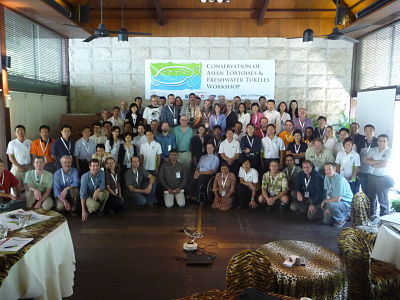Turtle Conservation Workshop Opens in Singapore
by Rick Hudson 

We were happy to see some old friends and meet some new ones at the Conservation of Asian Tortoises and Freshwater Turtles workshop at the Singapore Zoo. Over 70 delegates from 20 countries, including 16 Asian nations were in attendance.
Hosted by the Wildlife Reserves Singapore and the Wildlife Conservation Society, in collaboration with the Turtle Survival Alliance, Kadoorie Farm and Botanic Garden, San Diego Zoo Global and the IUCN Tortoise and Freshwater Turtle Specialist Group, the workshop summarized the turtle conservation activities over the past ten years in Asia.
Many of the same issues we heard about 10 years ago in Phnom Penh, Cambodia are still an issue, a disappointment but a reminder that we aren’t doing enough. There were some great highlights to the day mingled amongst the somber news; our Asian friends have not been sitting by idly. The scope and scale of the turtle trade in Asia is clearly still the problem and new countries and trade routes are being exploited. The numbers of turtles passing through some of these countries is almost incomprehensible; one country reported in excess of 40,000 lbs of turtles registered as being traded per year. This only represents what is passing through legally “on the books” and does not represent what is being transported illegally. One market in China reported in excess of one million turtles being sold annually with most of the turtles being endangered or critically endangered. Some of the rarer animals for the pet market are fetching prices of USD 25,000; it is little wonder these animals are being vacuumed from the landscape.
Throughout the day we began to see a common thread, trade is still a big issue and there is frustration amongst our colleagues about the lack of enforcement of current laws. The trade seizures are occurring with increasing frequency, yet most countries reported that they lack facilities to deal with these animals. It seems clear that strategically placed facilities along major trade routes are needed.
Tomorrow, we will have the IUCN Red-Listing session. Some of the country reports have already raised some new species specific issues and that the needs of numerous species need to be re-assessed. Also tomorrow, the veterinarians will be attending a workshop on how to handle and treat confiscated turtles. Other participants will attend a workshop on facility design. Tomorrow will end with future presentations on Turtle Trade, where we will truly hear about the magnitude of the problem.
